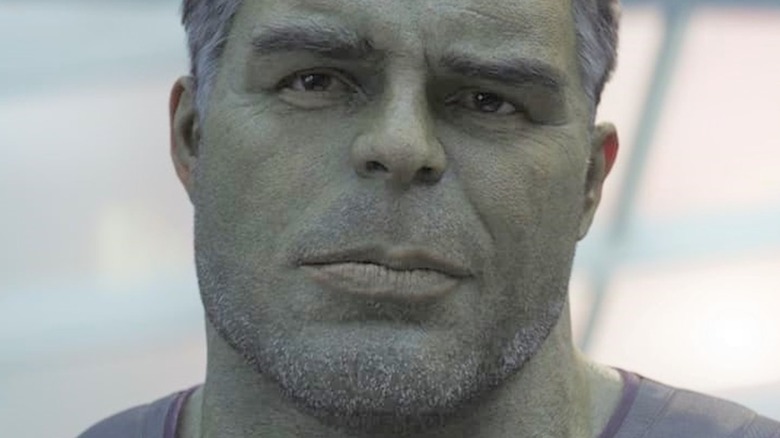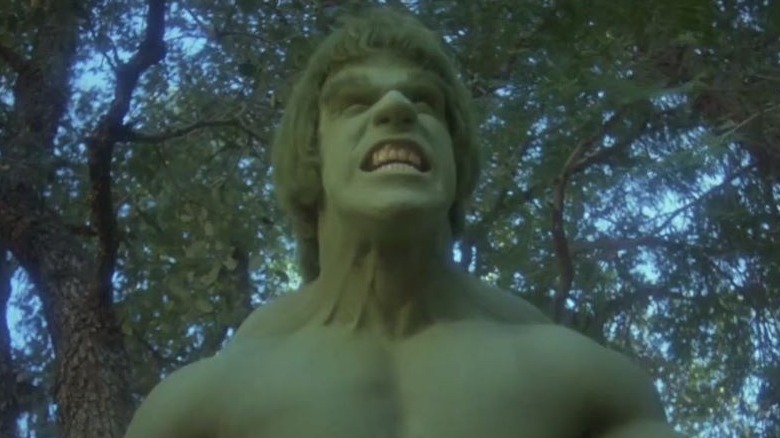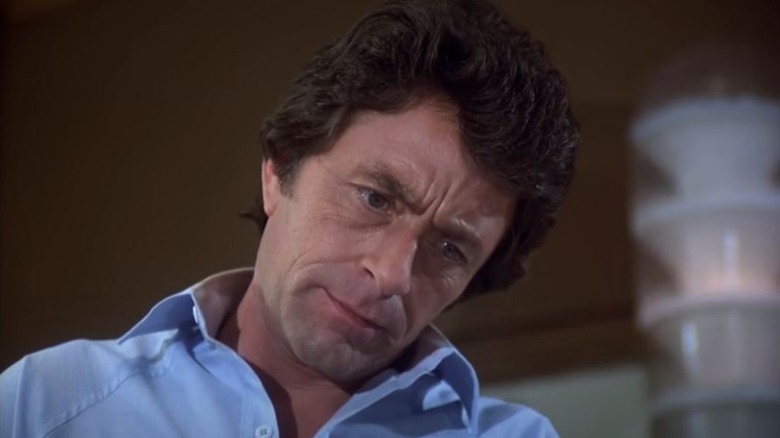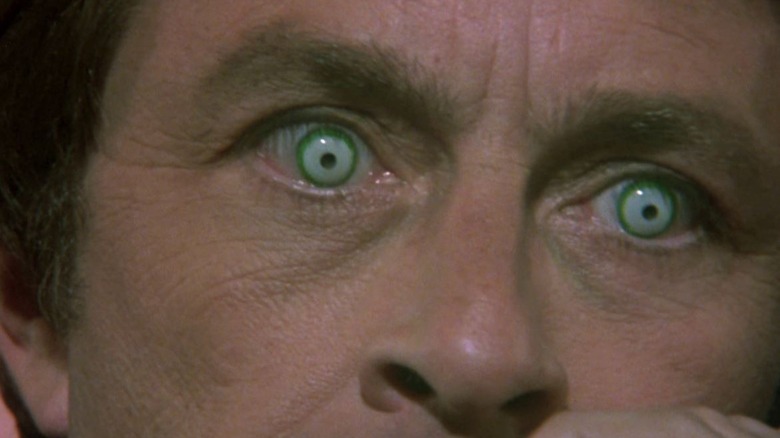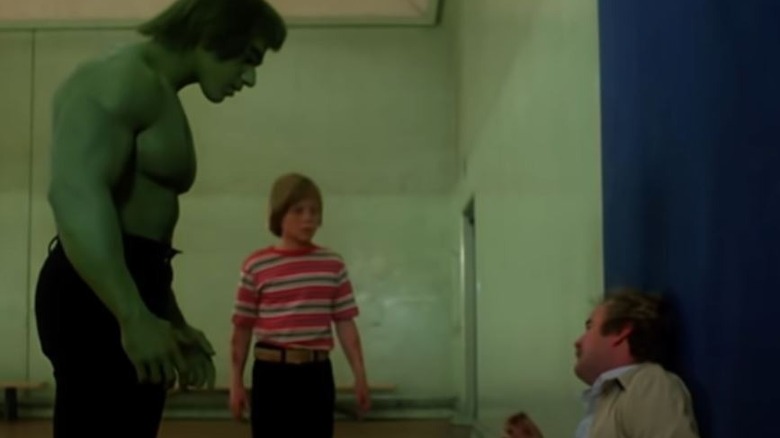The MCU Still Hasn't Come Close To Topping The Best Live-Action Hulk
There's a whole bunch of live-action Hulks out there, and with "She-Hulk: Attorney at Law" confirming that Bruce Banner's (Mark Ruffalo) blood can make new ones, we might just see several more in the not-too-distant future of the Marvel Cinematic Universe. Still, as charming as Ruffalo is in the role, his Hulk remains the MCU's ultimate supporting character who's yet to star in a movie of his own.
This may be because 2008's "The Incredible Hulk" is the MCU movie that made the least money in theaters. Perhaps Hulk is just a very challenging main character, especially now after "Avengers: Endgame" took him in the Professor Hulk direction. Or maybe, just maybe, the best live-action Hulk has already been done, and the bar has simply been raised too high.
Ruffalo, Edward Norton, and non-MCU Hulk Eric Bana have all delivered their own takes on the character, but there's an older, far superior version out there. Currently, the longest-serving actors to play Banner and Hulk are Bill Bixby and Lou Ferrigno, who portrayed the characters between 1977 and 1990. They had five seasons of "The Incredible Hulk" CBS show and numerous CBS and NBC movies to explore the characters, and their legacy is still very, very hard to top.
A practical effects Hulk is a wonderful thing
CGI is so advanced these days that Hafþór Júlíus Björnsson will probably never go through an arduous, Dave Bautista-style makeup transformation to portray Hulk opposite Ruffalo's Banner. However, back in the day, the most viable (and, let's face it, cheapest) option was to simply paint a bodybuilder green whenever the Hulk needed to show up. The fun thing about that approach is that it works. Without taking anything away from hard-working VFX artists or Ruffalo's mocap performance, a realistic, flesh-and-blood Hulk comes across as far more unnerving than a CGI one.
Sure, compared to later Hulks, stills of Ferrigno's version and his mullet wig can be amusing. However, when you see the character in motion, he's quite convincing. Ferrigno plays Hulk without the benefit of CGI, relying entirely on green body paint, facial prosthetics, and his own gigantic physique to convey the great monster. As a result, the character is present on the screen in a way the MCU Hulk is yet to achieve. He's a scary, yet utterly real character that you absolutely believe you could touch ... which is more than can be said about most of the computer creations that came after him.
Due to the era's production values and budget restrictions, Ferrigno's is a severely depowered Hulk who not only bleeds, but bleeds red. If you're looking for the skyscraper-jumping, kaiju-punching, missile-proof version of the character, prepare to be disappointed. However, this version of the character does what other versions have never really been able to do, through no fault of their actors: Simply because he's a flesh-and-blood performer interacting with other people on the set, Ferrigno has a far easier time conveying the character's fearsome ferocity — and his underlying heart.
He might be called David, but he's still the ultimate Bruce
A live-action Hulk can only be as good as his puny Banner, because let's face it, that's what he's going to spend 90 percent of time as. Fortunately, Bill Bixby absolutely nails the part in "The Incredible Hulk." The show's David Bruce Banner is a heartbroken researcher who lost his wife (Lara Parker) in an accident. The details of the tragedy prompt him to research gamma radiation, and after accidentally subjecting himself to a massive overdose in an experiment gone wrong, he gains a dangerous and unwanted power to turn into a physical manifestation of his grief-induced fury.
Ang Lee's "Hulk," 2008's "The Incredible Hulk," and the various appearances of Ruffalo's version have all devoted at least some time to Banner's emotional turmoil, but Bixby's version is easily the finest distillation of the Banner-Hulk dynamic: One of them is made of sorrow, the other of rage. Because of this purity, it's easy to buy him as a wandering hero who does his level best to right every wrong he comes across, and isn't afraid to get slapped around by the bad guys until he becomes angry enough for Hulk to emerge.
Of course, it also helps that Bixby is utterly magnetic in the role, as befits a man who entered the show as a two-time Emmy nominee (via IMDb). David Banner's constant Hulking out and penchant for using incredibly obvious "David B."-themed fake names might make him the least stealthy fugitive in history, but wherever the plot takes him, you can be sure that Bixby brings his A-game.
The transformation scene rules
The Ruffalo version of Banner tends to Hulk out with very little consistency, the transformation taking as much or little time as the scene requires. Given how much plot the MCU movies are generally stuffed with, playing fast and loose with the trait is a handy decision from a storytelling viewpoint, but it also takes something away from what should invariably be the biggest, most threatening character shift in the entire universe. Still, the approach is miles better than the wobbly transformation in 2003's "Hulk," which looks like Eric Bana ate a green jelly bean from Willy Wonka's chocolate factory.
Meanwhile, the Bixby-Ferrigno version gets things absolutely right. The show and the movies know what a monumental moment Hulking out should be, and as such, tend to milk it for all it's worth.
A typical "The Incredible Hulk" transformation scene might go as follows. David Banner becomes threatened or furious enough to Hulk out. He starts losing control, stumbling around and perhaps dramatically bumping into things as Bixby teeters on the edge of unintentional slapstick without ever quite crossing it. Then, suddenly, he opens his eyes, which have turned into an otherworldly shade of green. After this key moment, the transformation begins. It might happen offscreen, or focus on the face, or perhaps you just see closely cropped shots of Hulk's green musculature tearing Banner's shoes and clothes apart before the inevitable moment of big, angry revelation.
The effects budget clearly isn't great, but the end result is highly effective. So effective, in fact, that the Edward Norton version of the transformation in "The Incredible Hulk" is basically just a big-budget version of the Bixby one, complete with the dramatic eyes and splitting shoes.
The psychology factor takes things to another level
As "The Immortal Hulk" comics and many other Hulk-themed works show, the Hulk is above all a psychological character. Powerful and punch-happy as he may be, his relationship with Banner and the way they deal with the world despite their heaps of issues are the backbone of some of the most memorable Hulk stories out there.
Despite ostensibly being about a fairly classic wandering hero who just happens to have a rage monster alter ego, "The Incredible Hulk" dips its toes pretty deep in the psychology pool — deeper than other live-action takes on the Hulk, in fact. Banner's own grief is what drives him to accidentally create the Hulk in the first place. Once he goes on the run, his guilt over not being able to save his wife is a big part of what motivates him to save others along the way.
Meanwhile, the Hulk may be a non-verbal personification of pure fury, but he also demonstrates plenty of stealthy personality and nuance. Take the Season 1 moment when Hulk takes over after a violent father attacks Banner in a school gymnasium. The green giant approaches the terrified man, roaring and throwing equipment around — and when the father finally enters fight-or-flight mode, Hulk merely takes his punches and waits. Realizing how helpless he is against the monster, the guy has a flashback of his own abusive father, has a breakdown, and vows to be a better parent in the future.
And that, friends, is what really pushes this version of the character above and beyond the competition. Sure, other Hulks might be better at smashing, but let's see them casually reform antagonists by forcing them to face their deep-lying trauma.
If you or someone you know is dealing with domestic abuse, you can call the National Domestic Violence Hotline at 1−800−799−7233. You can also find more information, resources, and support at their website.
